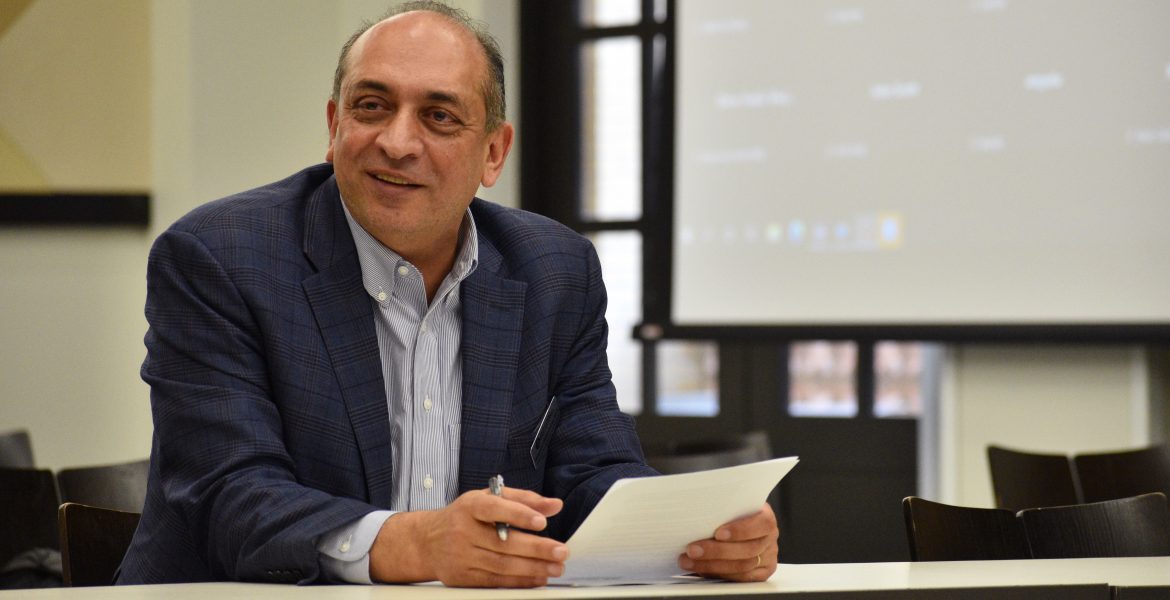For provost Mohamed Abdelrahman, the idea of class optimization doesn’t mean going into every class at Texas A&M University-San Antonio and changing the registration cap at random.
It requires finesse.
“It’s not meant to be in one direction,” Abdelrahman said in an interview Feb. 27.
In other words, Abdelrahman said optimization needs to work with the instructional needs of the students.
Some classes lend themselves to these instructional needs as some can support demand regardless of how many students sit before an instructor. It’s defining which classes can receive this refining that takes time, Abdelrahman said.
“We want to make sure that we are utilizing, you know, the time of the instructors in the best possible way in support of student success,” he said.
Throughout spring, Abdelrahman said he’d be working with a committee with representation from each of three the colleges at the university, including faculty senate and administrators.
The committee examines how instruction has been given in the past and ways to improve.
Some examples include writing intensive classes — which require plenty of engagement and feedback between students and instructors. These classes could already be at an optimal level with 20 students, but examination should still come into play to understand whether those students are being properly supported, Abdelrahman said.
Then, classes with several sections, each containing a small share of students, could instead be combined into fewer sections with more students. This while distributing the classes throughout the day for ease of access to students’ schedules, Abdelrahman added.
All while implementing classes within the right facilities, ensuring larger classes have the physical room necessary to support more people, he said.
In a March 29 interview, Leonard Cullo, vice president for Business Affairs and chief financial officer at A&M-San Antonio, said there’s a large investment into new buildings such as a Business and Library Hall south of the Classroom Hall and, most recently, the greenlighting to build a recreational center and a new dorm.
“We’ve got to make sure we grow responsibly,” Cullo said. “Just making sure we’re financially disciplined.”
Cullo replaced Kathryn Funk-Baxter as vice president for Business Affairs and chief financial officer after Funk-Baxter retired in the fall.
While taking that holistic look at classes, Abdelrahman said it’s essential to receive feedback from faculty and not have the entire project be “administrator-driven.”
In the committee, “administrators are only there to kind of guide the conversations to some extent,” he said.
Abdelrahman said engagement has been strong and with free communication.
“I have not seen this as being two teams that are negotiating, but rather, it’s one team that’s looking at, what is the best way moving forward?” Abdelrahman said. “It’s mainly us working together towards the best, you know, outcome for the entire institution.”
However, some instructors at A&M-San Antonio do not feel at liberty to freely comment their honest opinions on class optimization.
“While I could certainly answer your questions, honest answers would almost certainly result in a reprimand if not worse,” one instructor, who wished to remain anonymous, wrote to The Mesquite April 19. “That’s unfortunately the climate in which lecturers (and adjuncts) work.”
In an April 17 email, Izzat Alsmadi, Chair of Computing and Cybersecurity, wrote that reactions in his department have varied.
“Different reactions,” Alsmadi wrote. “Faculty understand that as we grow as a university, some classes will have to grow, specially (sic) low level, 1000 or 2000 level courses. But at the same time, with that growth, they expect different types of support and accommodation that should come with such increase, such as teaching assistant, tutoring, etc.”
Abdelrahman said the ultimate goal is student success and a sustainable budget model.
“Because when you don’t have a healthy budget, then you don’t have the resources to keep your best and brightest in terms of faculty and staff by providing fair and equitable compensation,” Abdelrahman said.
Cullo said transparent communication is an area of focus as he oversees the university’s budget.
“I would like to push the responsibility to my fellow vice presidents and in department heads that we would work with them to find what we believe is the right allocation of all our resources,” Cullo said.
Abdelrahman said the answers found by the committee will be used to guide department chairs on which classes could have their registration caps changed. This process will be gradual and must consider an approach that can support faculty through the changes to make sure students are well engaged.
“And this will differ by every college or discipline, you know?” Abdelrahman said.
Abdelrahman said the word “guideline” is key here, as programs and the university itself will keep evolving, and implementing “rigid” rules could negatively impact growth and adaptability.
The committee meets about every week based on needs as it’s “a large committee,” Abdelrahman said.
Abdelrahman said there is no hard, definitive number on how much registration caps must be increased to see more revenue.
There are other variables at play, such as having a professor — who would require higher compensation — instruct a course over an adjunct, he added.
Cullo said, “It’s really about cost optimization rather than increasing revenue” while ensuring good quality instruction for students.
“That’s something that’s going to be over time, not a dramatic shift, but it’s definitely the right thing to do,” Cullo said.
Optimizing classes is not a “one time and then it’s done,” Abdelrahman said.
“This should be a continuous effort of continuous improvement,” he said.






